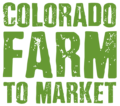Definition: In cooking, a syrup is a thick, viscous liquid consisting primarily of a solution of sugar in water. Syrups may include, maple syrup, fruit syrups, corn syrup, molasses, or other flavored syrups.
Food Safety Considerations: Exposure to lead from different sources has been a public health concern for many years. Lead has been proven to have adverse effects on human health, especially for the nervous system. Lead in maple syrup can come from several sources, however the primary source is from lead contamination in equipment. Maple syrup is an acidic substance (pH 3.4-6.6) that, in the presence of oxygen, can react with metal surfaces. Contact time of maple syrup with any lead-containing metal should be minimized throughout all collection, processing, and storage activities. Please visit the related links listed below for more information.
Distribution Method | Collapse All)
You are selling your product at a farmers’ market, CSA, roadside stand, or other direct to consumer outlet
If you are selling shelf-stable syrup you have produced using unprocessed farm products you purchased from another Colorado producer or from a wholesaler, such as raw fruit, you will also need a Farm Product Dealers License. For more information on what is considered an unprocessed farm product, consult General Licensing Requirements.
If you are selling shelf-stable syrup produced by someone else, you are exempt from licensing but must purchase from a licensed wholesaler.
Labeling: General labeling requirements.
Sales Tax Liability: General sales tax information.
Weights and Measures: If you are selling your product by weight, you must follow the Colorado weights and measures requirements.
You are selling your product to a store, restaurant, food cart, K-12 school, university, hospital, or other retail food establishment
Note that if you are selling at farmers’ market and as a wholesaler, you will need a to obtain a retail food establishment license and register as a wholesale food manufacturer.
Labeling: General labeling requirements.
Sales Tax Liability: General sales tax information.
Weights and Measures: If you are selling your product by weight, you must follow the Colorado weights and measures requirements.
Related Links:
